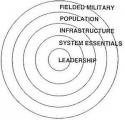THE 1987 CONSTITUTION OF THE REPUBLIC OF THE PHILIPPINES
ARTICLE: XVIII
Section 25. After the expiration in 1991 of the Agreement between the Republic of the Philippines and the United States of America concerning military bases, foreign military bases, troops, or facilities shall not be allowed in the Philippines except under a treaty duly concurred in by the Senate and, when the Congress so requires, ratified by a majority of the votes cast by the people in a national referendum held for that purpose, and recognized as a treaty by the other contracting State.
Mutual Defense Treaty (U.S.–Philippines)
Article IV
Each Party recognizes that an armed attack in the Pacific Area on either of the Parties would be dangerous to its own peace and safety and declares that it would act to meet the common dangers in accordance with its constitutional processes. Any such armed attack and all measures taken as a result thereof shall be immediately reported to the Security Council of the United Nations. Such measures shall be terminated when the Security Council has taken the measures necessary to restore and maintain international peace and security.
Article V
For the purpose of Article IV, an armed attack on either of the Parties is deemed to include an armed attack on the metropolitan territory of either of the Parties, or on the island territories under its jurisdiction in the Pacific or on its armed forces, public vessels or aircraft in the Pacific.
Bajo de Masinloc
Bajo de Masinloc is an integral part of the Philippine territory. It is part of the Municipality of Masinloc, Province of Zambales. It is located 124 nautical miles (220 kilometers) west of Zambales and is within the 200- nautical-mile (370 kilometers) exclusive economic zone (EEZ) and Philippine continental shelf.
A Philippine Navy surveillance aircraft, patrolling the area to enforce the Philippine Fisheries Code and marine environment laws, spotted eight Chinese fishing vessels anchored inside the Bajo de Masinloc (Panatag Shoal) on Sunday, April 8, 2012. On April 10, the Philippine Navy sent the BRP Gregorio del Pilar to the area. In accordance with established rules of engagement, an inspection team was dispatched and it reported finding large amounts of illegally collected corals, giant clams and live sharks in the compartments of the Chinese fishing vessels.
The actions of the Chinese fishing vessels are a serious violation of the Philippines’ sovereignty and maritime jurisdiction. The poaching of endangered marine resources is a violation of the Fisheries Code and the Convention on International Trade in Endangered Species of Wild Flora and Fauna (CITES).
Basis of sovereignty
Bajo de Masinloc (international name, Scarborough Shoal) is not an island. Bajo de Masinloc is also not part of the Spratlys.
Bajo de Masinloc is a ring-shaped coral reef, which has several rocks encircling a lagoon. About five of these rocks are above water during high tide. Some of these rocks are about three meters high and can be seen above the water. The rest of the rocks and reefs are submerged during high tide.
Bajo de Masinloc’s chain of reefs and rocks is about 124 nautical miles (220 km) from the nearest coast of Luzon and approximately 472 nautical miles (850 km) from the nearest coast of China. Bajo de Masinloc is located approximately along latitude 15°08’N and longitude 117°45’E. The rocks of Bajo de Masinloc are situated north of the Spratlys.
Obviously then the rocks of Bajo de Masinloc are also within the 200 nautical mile EEZ and the 200 nautical mile continental shelf of the Philippines.
Distinction
A distinction has to be made between the rocks of Bajo de Masinloc and the larger body of water and continental shelf where the geological features are situated. The rights or nature of rights of the Philippines over Bajo de Masinloc are different from the rights it exercises over the larger body of water and continental shelf.
The Philippines exercises full sovereignty and jurisdiction over the rocks of Bajo de Masinloc, and sovereign rights over the waters and continental shelf where the rocks of Bajo de Masinloc are situated.
The basis of Philippine sovereignty and jurisdiction over the rocks of Bajo de Masinloc is distinct from that of its sovereign rights over the larger body of water and continental shelf.
A. Public international law
The rocks of Bajo de Masinloc are Philippine territory.
The basis of Philippine sovereignty and jurisdiction over the rocks is not premised on the cession by Spain of the Philippine archipelago to the United States under the Treaty of Paris. That the rocks of Bajo de Masinloc are not included or within the limits of the Treaty of Paris, as alleged by China, is therefore immaterial and of no consequence.
Philippine sovereignty and jurisdiction over the rocks is likewise not premised on proximity or the fact that the rocks are within its 200 nautical mile EEZ or continental shelf under the UN Convention on the Law of the Sea (Unclos). Although the Philippines necessarily exercises sovereign rights over its EEZ and continental shelf, the reason why the rocks of Bajo de Masinloc are Philippine territory is anchored on other principles of public international law.
As decided in a number of cases by international courts or tribunals, most notably the Palmas Island Case, a mode for acquiring territorial ownership over a piece of real estate is effective exercise of jurisdiction. In the Palmas case, sovereignty over the Palmas Island was adjudged in favor of the Netherlands on the basis of “effective exercise of jurisdiction” although the island may have been historically discovered by Spain and historically ceded to the United States in the Treaty of Paris.
In the case of Bajo de Masinloc, the Philippines, since it gained independence, has exercised both effective occupation and effective jurisdiction over Bajo de Masinloc.
The name Bajo de Masinloc (which means Shallows of Masinloc or Masinloc Shoal) itself identifies the shoal as a particular political subdivision of the Philippine province of Zambales, known as Masinloc.
Maps
One of the earliest known and most accurate maps of the area, named Carta Hydrographical y Chorographica de las Yslas Filipinas by Fr. Pedro Murillo Velarde, SJ, and published in 1734, showed Bajo de Masinloc as part of Zambales.
The name Bajo de Masinloc was given to the shoal by the Spanish colonizers. In 1792, another map, drawn by the Alejandro Malaspina expedition and published in 1808 in Madrid, Spain, also showed Bajo de Masinloc as part of Philippine territory. This map showed the route of the Malaspina expedition to and around the shoal. It was reproduced in the Atlas of the 1939 Philippine Census.
The Mapa General, Islas Filipinas, Observatorio de Manila published in 1990 by the US Coast and Geodetic Survey, also showed Bajo de Masinloc as part of the Philippines.
Philippine flags have been erected on some of the islets of the shoal, including a flag raised on an 8.3-meter high flag pole in 1965 and another Philippine flag raised by Congressmen Roque Ablan and Jose Yap in 1997. In 1965, the Philippines built and operated a small lighthouse on one of the islets in the shoal. In 1992, the Philippine Navy rehabilitated the lighthouse and reported it to the International Maritime Organization for publication in the List of Lights (currently this lighthouse is not working).
Bajo de Masinloc was also used as target range by Philippine and US naval forces stationed in Subic Bay in Zambales. The Philippines’ Department of Environment and Natural Resources together with the University of the Philippines has also been conducting scientific, topographic, and marine studies in the shoal. Filipino fishermen have always considered the shoal their fishing grounds because of its proximity to the coast of southwest Luzon.
Archipelagic baselines
In 2009, when the Philippines passed an amended Archipelagic Baselines Law fully consistent with Unclos, Bajo de Masinloc was classified under the “Regime of Islands” consistent with the Law of the Sea.
“Section 2. The baseline in the following areas over which the Philippines likewise exercises sovereignty and jurisdiction shall be determined as “Regime of Islands” under the Republic of the Philippines consistent with Article 121 of the Unclos:
a) The Kalayaan Island Group as constituted under Presidential Decree No. 1596; and
b) Bajo de Masinloc, also known as Scarborough Shoal.”









Bookmarks